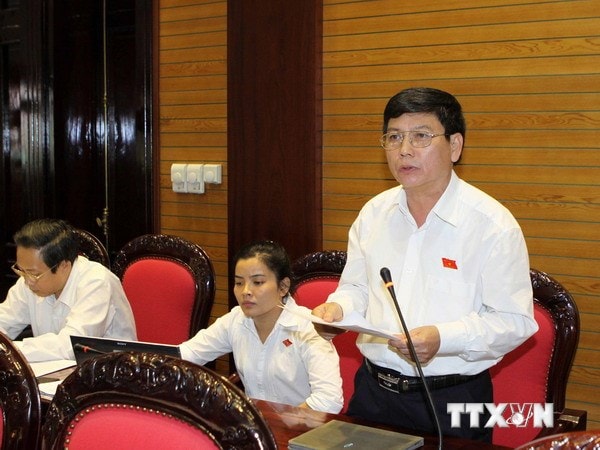Overcoming limitations in voting and voting of confidence
On the morning of June 6, National Assembly deputies listened to the Submission and Verification Report on amending and supplementing Resolution 35/2012/QH13 of the National Assembly on taking a vote of confidence and voting for confidence in people holding positions elected or approved by the National Assembly or People's Council.
 |
| National Assembly delegate of Quang Binh province Tran Minh Dieu speaks at the meeting. Photo: VNA |
This is an extremely important content to concretize the Party's policies, the provisions of the Constitution, laws and the development requirements of our country in the new period. Resolution 35 has been reviewed and evaluated by the National Assembly Standing Committee, drawing lessons from experience and has received the attention and interest of the public and voters nationwide.
The organization of the vote of confidence has achieved its goals and requirements.
Implementing the Resolution of the National Assembly, at the 5th session, the 13th National Assembly organized a vote of confidence for 47 people holding positions elected or approved by the National Assembly. The People's Councils at the provincial, district and communal levels also conducted a vote of confidence.
According to the general assessment, the organization of the vote of confidence achieved the set goals and requirements, was closely directed, conducted seriously, cautiously, objectively, in accordance with the law, and received the attention, agreement, and support of a large number of cadres and people.
The results of the vote of confidence basically reflect the level of trust of each person at the time of voting; have practical effects on the people being voted, helping them to self-regulate in performing their assigned duties and tasks and to cultivate their political qualities, ethics and lifestyle. This is truly an important information channel for competent agencies and organizations to consider the level of trust and evaluate cadres more accurately.
However, the Report of the National Assembly Standing Committee stated that because this is the first time the National Assembly and the People's Council have organized a vote of confidence, there is no precedent, and experience is being learned while doing so, so the regulations and the implementation process cannot avoid limitations and problems.
The proposal to review, amend and supplement Resolution No. 35 focuses mainly on the subjects of the vote of confidence; the time of the vote of confidence; the assessment level in the vote of confidence; the consequences for those who are assessed as having "low confidence" while supplementing and clarifying a number of points on the process and procedures for taking the vote of confidence and voting.
Keep the subject, credit rating level
The agency examining the draft of the revised Resolution 35 - the National Assembly's Law Committee agreed to continue keeping the scope of people eligible for a vote of confidence at the National Assembly and People's Councils as prescribed in Resolution No. 35.
The Law Committee agreed with the proposal to amend the time limit and timing of the vote of confidence as in the draft Resolution, which is to organize a vote of confidence once in the third year of each term, and for the 2011-2016 term, continue to organize the vote of confidence at the meeting at the end of 2014.
The regulation on organizing a vote of confidence once per term not only ensures a mechanism for monitoring and evaluating cadres, but also creates conditions for cadres to have enough time to demonstrate their capacity and qualifications, and at the same time creates conditions for competent authorities to prepare to adjust or replace cadres when necessary.
The Law Committee agreed to continue to prescribe three levels of confidence assessment for the vote of confidence as stipulated in Resolution No. 35: “high confidence,” “confidence,” and “low confidence.”
The determination of these three levels is to ensure prudence in personnel work and is consistent with the characteristics of personnel work in our country. The inspection agency believes that in cases where a person holding a position elected or approved by the National Assembly or People's Council commits mistakes, shortcomings, violates the law, violates ethics or lifestyle, then the National Assembly deputies, People's Council deputies or other competent agencies and organizations have the right to propose a vote of confidence for the National Assembly or People's Council to consider the responsibility of these people.
Regarding the consequences for those who are rated as “low confidence” by the National Assembly or People’s Council, according to the Report of the National Assembly Standing Committee, for those who are voted on, when more than half of the total number of National Assembly deputies or People’s Council deputies rate “Low confidence”, they can resign. In case the person who is voted on has more than half but less than two-thirds of the total number of National Assembly deputies or People’s Council deputies rate “Low confidence”, the National Assembly Standing Committee shall submit to the National Assembly, and the People’s Council Standing Committee shall submit to the People’s Council for a vote of confidence at the next session; for those who are rated as “Low confidence” by two-thirds or more of the total number of National Assembly deputies or People’s Council deputies, the National Assembly Standing Committee shall submit to the National Assembly, and the People’s Council Standing Committee shall submit to the People’s Council for a vote of confidence at that same session.
Regarding the report of the person being voted for, the National Assembly Standing Committee believes that it is necessary to clearly supplement the following contents: Results of performing tasks and powers; moral qualities, lifestyle; limitations, shortcomings and causes; and directions for overcoming.
Also this morning, the National Assembly discussed in the hall the draft Law amending and supplementing a number of articles of the Law on Vocational Training.
According to Vietnam+






